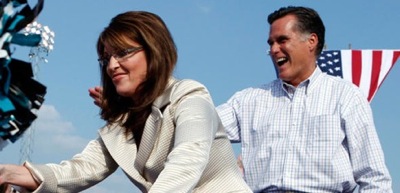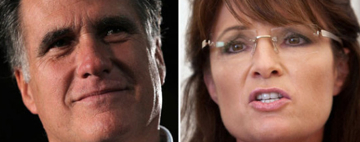Sarah Palin is now busting Mitt Romney's chops whenever she can for not having sufficient "conservative instincts" in his quest for the Republican presidential nomination. She also has ruffled his feathers a bit by raising the specter of a brokered GOP convention in Tampa.
But during Palin's successful 2006 gubernatorial campaign in Alaska, both Palin's and Romney's political ambitions converged while Romney was still the governor of Massachusetts and then serving as Chairman of the controversial Republican Governors Association (RGA). They were a veritable Bonnie and Clyde on the campaign trail.

During the final weeks of her campaign in September of 2006, Palin was the beneficiary of a $107,000 television advertisement campaign paid for and produced by the RGA. The Alaska Public Offices Commission (APOC) later fined the RGA (with Romney at the helm) $26,600 for two separate activities related to Palin's gubernatorial campaign and warned that the fine could have been levied as high as $6 million. The fines levied by APOC against the RGA were for distributing campaign mailers within 30 days of the election, and because television advertisements the RGA produced featuring Palin were obviously broadcast for partisan purposes.
The RGA television ads went negative on Palin's chief opponent in the race, former Democratic governor Tony Knowles. One of them featured Knowles walking backwards in slow motion. The ad also contained footage of Palin jauntily leaving an Anchorage hotel that clearly looked staged--and that's because it apparently was, according to Palin's former director of boards and commissions, Frank Bailey, who worked closely with her on the campaign.
Such outside advertising campaigns are common, but Alaska election law strictly requires that there be no "coordination" between the candidate and their campaign with the so-called "527 group" organizing and producing the ads.
Both Palin and Romney escaped any personal accountability for the questionable activities of their respective organizations. But leaked emails from the Palin campaign reveal that there was, in fact, coordination between Palin's campaign, Romney and the RGA--which is illegal under Alaska campaign laws--though in respect to the issue of "coordination," APOC dismissed the complaint and issued no sanctions.
The tell-tale emails were originally leaked to me by a former Palin campaign adviser for my book The Lies of Sarah Palin: The Untold Story Behind Her Relentless Quest for Power. I included excerpts from them in my Prologue in a passage that focused on Palin's "pathology of deceit." The emails were also referenced in a book by Bailey entitled Blind Allegiance.
In his book, Bailey, who was once dubbed Palin's "hatchet man," provides further corroboration of the coordination between Palin's campaign and the Romney-chaired RGA. Bailey devotes two chapters to what he concedes was an "illegal" enterprise. He acknowledges that he was first contacted by RGA go-betweens as early as August of 2006, and that he was aware that any coordination between the two organizations would be in violation of state election laws--and that he stated as much to others in the campaign. (Bailey also contends that someone who worked on the production later confided in him that coordination had taken place.)
On August 28, Palin's friend and campaign co-worker Ivy Frye sent out an email to Palin's campaign team, including Palin, that she "just got a call from the [RGA] inquiring about who our campaign legal council [sic] is? Hmmm." A meeting was scheduled between Palin and Romney the following day at the Anchorage airport, only to have it broken by Romney. But various operatives for the RGA--including Romney--continued to reach out to the Palin campaign.
On September 6, 2006, Palin's close confidante and campaign manager Kris Perry sent out an email (pdf) to Palin noting that she had spoken directly to Romney:
Had a nice conversation w/Governor Romney. He'd like to speak with you directly and we'll try to make that happen in the next day or so. He's traveling in the morning but will give me a call once he reaches his destination. Bottom line: they are very interested in this Governor's race and are supportive of your candidacy. They want to support financially and are exploring the most effective means of doing so. I explained to him what we're facing here in Alaska with our own Republican Party and $$.
According to Bailey, Palin at the time "didn't even have a clear idea" who Romney was and apparently thought that Romney's first name was "Milt," not Mitt.
Less than a half-hour later, Perry then sent out yet another email to the campaign's inner circle, also including Palin, indicating "it's important that we keep each other in the loop" about RGA activities and further indicated that she was "putting together a list of potential businesses/contacts for the RGA for the purpose of fundraising"--in other words, more coordination.

Others in Alaska were also coordinating on behalf of Romney and the RGA. Kristopher Knauss, who had worked as Frank Murkowski's policy director, emailed Bailey that "the RGA will be in Anchorage next week and a poll is going into the field in the next 48 hours," and that he wanted to give "you [Bailey] and Sarah a heads-up" about RGA activities.
Once the illegal television advertisements began to air in late September, Tim Barry, then serving as communications director for the Alaska Department of Fish and Game, sent Frye and Palin a lengthy email entitled "RGA," in which he advised that Palin not engage media queries about the ad: "I strongly urge you to respond NOT by having the candidate address the issue. Someone lower down in the campaign should tell reporters that the campaign has asked the RGA to stop running the ads...while pointing out that Sarah has no control over them."
On October 4, Palin weighed in on the ads herself via an email to her campaign team. She auditioned what would be her duplicitous public response: "'I would not have mentioned Tony had this been our production. And I would have spun it all more positively.' Whaddya' think?" Then she relayed a discussion taking place in the Palin household about the ads:
Bristol and Willow are arguing it now - W [Willow] says it's totally negative and to 'delete it now, Mom!' and B [Bristol] says, 'Hey, it's free publicity.'
According to an APOC representative I spoke to prior to the release of my book, the Palin campaign emails never surfaced during their investigation. Bailey and other campaign staffers did not make them available at the time. Had they been, it might have provided a different outcome to the APOC investigation on the matter of "coordination." According to attorneys in Anchorage, the statute of limitations on Alaska campaign laws at the time of the Palin-RGA violation was one year. Today it is five.
Those working in the Knowles campaign suspected that there had been coordination between Palin and the Romney-led RGA all along. "After everything we have learned about Sarah Palin since 2008," said then-Knowles campaign manager Leslie Ridle, "I think Alaskans see this as another disappointment but certainly not a surprise. She talks a lot about 'country first,' but the more we see of Sarah Palin, the more she brands herself as 'Sarah first.' It's no surprise at all."

Award-winning writer and filmmaker Geoffrey Dunn's best-selling The Lies of Sarah Palin: The Untold Story Behind Her Relentless Quest for Power was published by Macmllan/St. Martin's in May of 2011.
